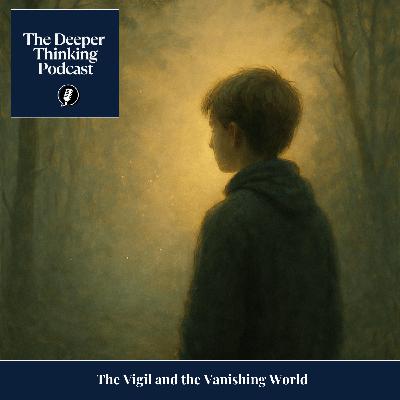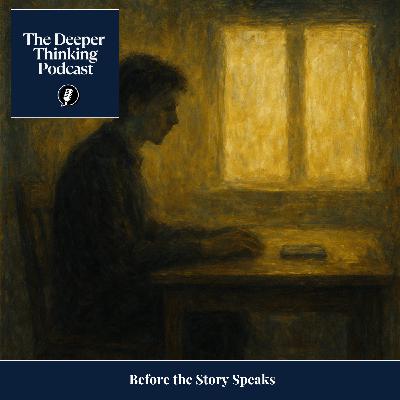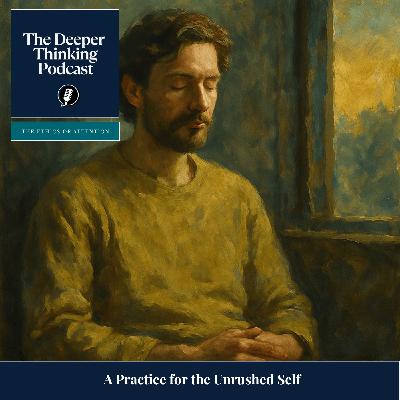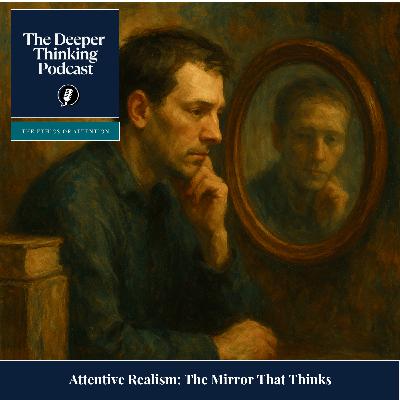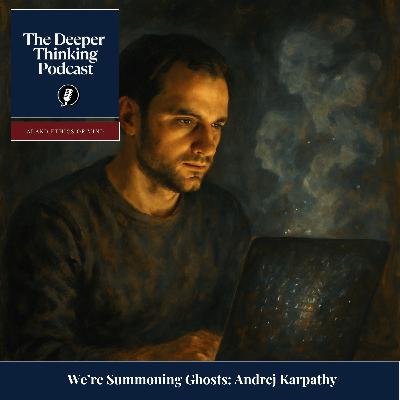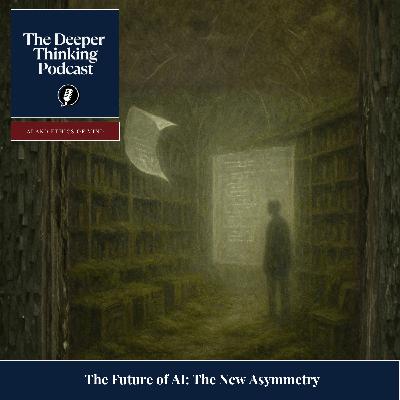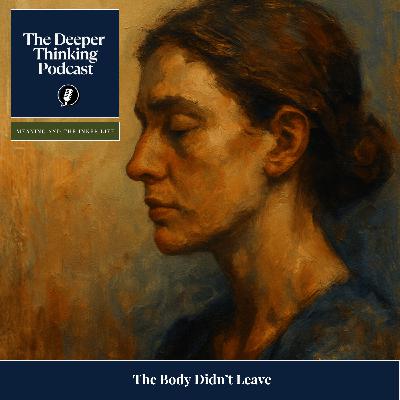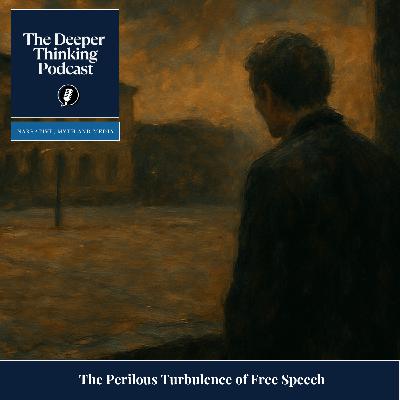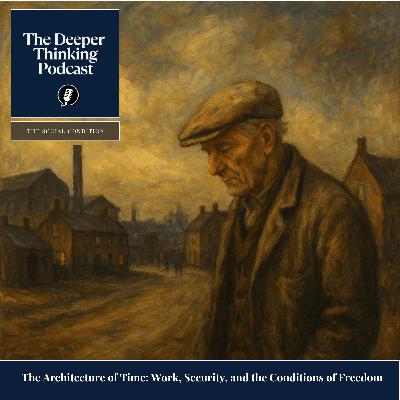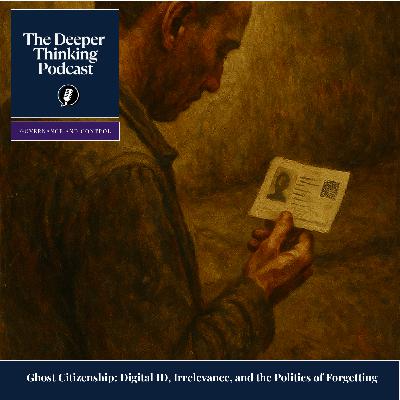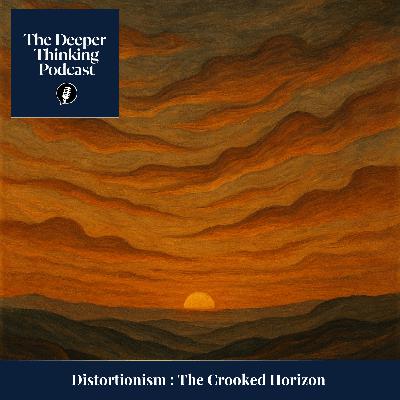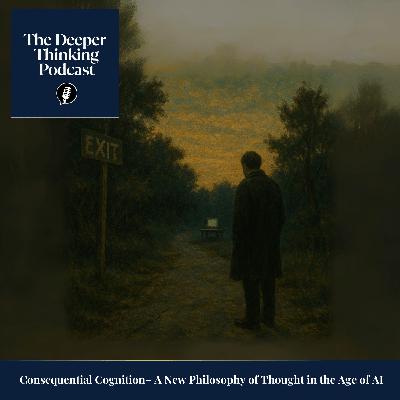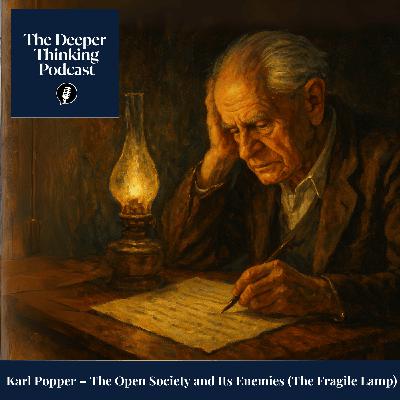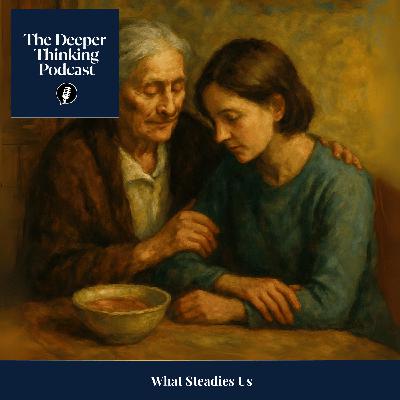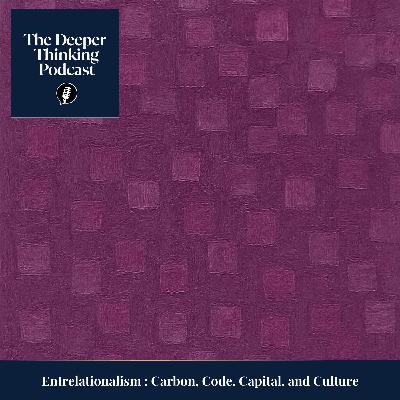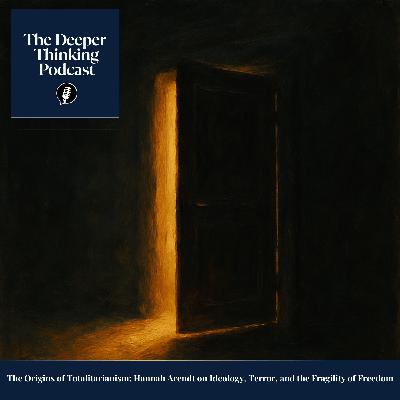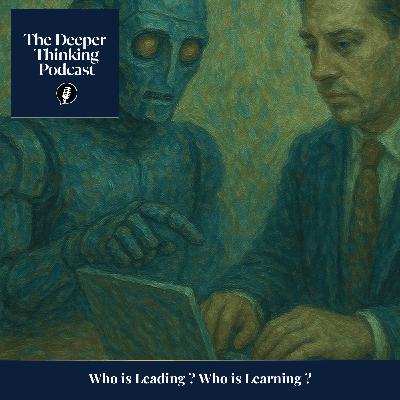Discover The Deeper Thinking Podcast
The Deeper Thinking Podcast

The Deeper Thinking Podcast
Author: The Deeper Thinking Podcast
Subscribed: 27Played: 682Subscribe
Share
© Copyright 2024 All rights reserved.
Description
The Deeper Thinking Podcast
The Deeper Thinking Podcast offers a space where philosophy becomes a way of engaging more fully and deliberately with the world. Each episode explores enduring and emerging ideas that deepen how we live, think, and act. We follow the spirit of those who see the pursuit of wisdom as a lifelong project of becoming more human, more awake, and more responsible. We ask how attention, meaning, and agency might be reclaimed in an age that often scatters them. Drawing on insights stretching across centuries, we explore how time, purpose, and thoughtfulness can quietly transform daily existence. The Deeper Thinking Podcast examines psychology, technology, and philosophy as unseen forces shaping how we think, feel, and choose, often beyond our awareness. It creates a space where big questions are lived with—where ideas are not commodities, but companions on the path. Each episode invites you into a slower, deeper way of being. Join us as we move beyond the noise, beyond the surface, and into the depth, into the quiet, and into the possibilities awakened by deeper thinking.
The Deeper Thinking Podcast offers a space where philosophy becomes a way of engaging more fully and deliberately with the world. Each episode explores enduring and emerging ideas that deepen how we live, think, and act. We follow the spirit of those who see the pursuit of wisdom as a lifelong project of becoming more human, more awake, and more responsible. We ask how attention, meaning, and agency might be reclaimed in an age that often scatters them. Drawing on insights stretching across centuries, we explore how time, purpose, and thoughtfulness can quietly transform daily existence. The Deeper Thinking Podcast examines psychology, technology, and philosophy as unseen forces shaping how we think, feel, and choose, often beyond our awareness. It creates a space where big questions are lived with—where ideas are not commodities, but companions on the path. Each episode invites you into a slower, deeper way of being. Join us as we move beyond the noise, beyond the surface, and into the depth, into the quiet, and into the possibilities awakened by deeper thinking.
223 Episodes
Reverse
The Silent Coup: How “Too Big to Fail” Became a Constitutional Crisis
The Deeper Thinking Podcast is digitally narrated.
For those drawn to the hidden architectures of power, the politics of fragility, and the quiet erosion of sovereignty.
#TooBigToFail #KarlPolanyi #WolfgangStreeck #QuinnSlobodian #EastIndiaCompany #GreekDebtCrisis #PoliticalEconomy #Democracy
What happens when a democracy discovers that its sovereignty is conditional. In this episode, we follow the quiet trail of too big to fail, from a banking slogan to a deeper transformation of constitutional life. We trace how certain institutions grow so large and so entangled with everyday routines that their failure becomes unthinkable, and how that unthinkability slowly reorders who governments fear, who they answer to, and what they dare to change.
This is not only a story about finance. It is a story about sovereignty, consent, and the thin line between stability and capture. Drawing on Karl Polanyi and his account of market society, on Wolfgang Streeck on public debt and democratic constraint, and on Quinn Slobodian on the insulation of markets from popular will, we follow the long arc from Renaissance Florence and the Medici bank, through the East India Company, to the Greek government debt crisis.
Along the way, we sit with nurses, teachers, pensioners and policymakers as they encounter the same invisible boundary. A state that appears free to act finds that its most consequential decisions must pass through an informal veto held by institutions whose collapse would injure millions. We ask what it means to live in a democracy where losses are socialised, gains are privatised, and the real constitutional line runs not between branches of government, but between the public that votes and the balance sheets it cannot see.
Reflections
This episode traces how fragility becomes a form of power, and how a policy language of stability can conceal a slow transfer of sovereignty away from the people living under it.
Here are some other reflections that surfaced along the way:
Too big to fail is not just a financial category, it is a constitutional condition.
When one failure can injure a nation, fear begins to govern in place of law.
Dependency forms as efficiency first, necessity later, inevitability last.
Every bailout writes another unwritten rule about who may not be allowed to fall.
Democracy can keep its rituals while losing its room to decide.
Market reactions arrive in seconds, public reactions arrive in months.
Fragility at the top becomes discipline for everyone else.
Rescues that restore normality can also deepen the next crisis of consent.
Sovereignty thins not through coups, but through habits of caution that no one voted for.
Why Listen?
Reframe too big to fail as a problem of democracy, not only of finance.
Explore how Polanyi helps us see bailouts and austerity as part of a longer struggle over markets and society.
Follow Streeck on public debt, fiscal pressure, and the shrinking space of democratic choice.
Engage with Slobodian on how global economic orders can sideline domestic publics.
See the East India Company and Greece as part of the same long story about private power and public dependence.
Listen On:
YouTube
Spotify
Apple Podcasts
Support This Work
If this episode stayed with you and you would like to support the ongoing work, you can do so here: Buy Me a Coffee
Bibliography
Polanyi, Karl. The Great Transformation. Boston: Beacon Press, 2001.
Streeck, Wolfgang. Buying Time: The Delayed Crisis of Democratic Capitalism. London: Verso, 2014.
Slobodian, Quinn. Globalists: The End of Empire and the Birth of Neoliberalism. Cambridge, MA: Harvard University Press, 2018.
Robins, Nick. The Corporation that Changed the World: How the East India Company Shaped the Modern Multinational. London: Pluto Press, 2012.
Bibliography Relevance
Karl Polanyi: Shows how market society is created and maintained by states, not discovered, and how attempts to disembed markets provoke protective countermovements.
Wolfgang Streeck: Traces how public debt and austerity narrow democratic options and bind states more tightly to creditor expectations.
Quinn Slobodian: Examines how economic orders are designed to shield markets from democratic interference, a key backdrop for understanding too big to fail.
Nick Robins: Reconstructs the East India Company as an early example of a private institution acquiring quasi sovereign power through state dependence.
Stability is not neutral. It always answers to someone. The question is whether it answers to the public that bears its cost.
#TooBigToFail #ConstitutionalCrisis #PoliticalEconomy #KarlPolanyi #WolfgangStreeck #QuinnSlobodian #EastIndiaCompany #GreekDebtCrisis #FinancialCrisis #Sovereignty #Democracy #PublicDebt #MoralHazard #SystemicRisk #PoliticalPhilosophy #EconomicSociology #CivicLife #TheDeeperThinkingPodcast #PublicThought
The Vigil and the Vanishing World
The Deeper Thinking Podcast is digitally narrated.
For those drawn to the ethics of attention, the fragility of perception, and the quiet struggle to remain human in a predictive age.
#SimoneWeil #IrisMurdoch #Phenomenology #Attention #AI #Prediction #Embodiment
What happens when the world no longer waits for us? In this episode, we explore the erosion of the interval in which reality reveals itself. Drawing on Simone Weil's philosophy of attention and Iris Murdoch's vision of unselfing, we trace how predictive systems collapse the space where moral and perceptual judgment form. The Vigil is not nostalgia. It is the last form of resistance in a culture that replaces presence with prediction, and seeing with being seen.
This episode enters the slow domain of embodied perception. Through the thought of Weil, Murdoch, and the phenomenological tradition shaped by figures like Maurice Merleau Ponty and Henri Bergson, we explore the movements of attention that cannot be automated, accelerated, or smoothed. These thinkers reveal why understanding is slow, why reality resists simplification, and why the body remains the last anchor against the machinery of prediction.
We ask what it means to see without extracting, to look without leaning forward, to inhabit the quiet that modern systems have rendered almost impossible. The Vigil becomes not an escape from technology but a stance within it: a refusal to let the world vanish into smoothness, speed, and preemption.
Reflections
This episode explores the thinning of perception in a predictive age and asks how attention might be restored as an ethical act.
Here are a few reflections that surfaced along the way:
Attention is not focus, it is the willingness to be changed by what we see.
Prediction is not insight; it is the narrowing of what the future is allowed to be.
Synthetic intimacy imitates closeness while removing risk and presence.
The body is the last frictional site where the real resists smoothness.
Slowness is not inefficiency, it is the medium of understanding.
The Vigil is not withdrawal; it is the recovery of perceptual freedom.
When nothing is allowed to surprise us, nothing can teach us.
The world vanishes not when it disappears, but when we lose the interval required to meet it.
The self thins when every question arrives pre-answered.
Why Listen?
Reclaim attention as an ethical and perceptual practice
Understand how predictive systems collapse the space where judgment forms
Explore the insights of Weil, Murdoch, Merleau Ponty, and Bergson
Learn why embodiment, duration, and friction matter for perception
Discover how the Vigil offers a stance of resistance in a predictive world
Listen On:
YouTube
Spotify
Apple Podcasts
Support This Work
If this episode stayed with you and you’d like to support the ongoing work, you can do so here: Buy Me a Coffee
Bibliography
Weil, Simone. Gravity and Grace. London: Routledge, 1952.
Murdoch, Iris. The Sovereignty of Good. London: Routledge, 1970.
Merleau Ponty, Maurice. Phenomenology of Perception. London: Routledge, 1962.
Bergson, Henri. Matter and Memory. New York: Zone Books, 1991.
Bibliography Relevance
Simone Weil: Illuminates the moral weight and fragility of attention.
Iris Murdoch: Shows how unselfing disrupts the gravitational pull of ego.
Maurice Merleau Ponty: Grounds perception in the living body, not abstraction.
Henri Bergson: Reveals duration as the temporal medium of real understanding.
Attention is the last place where the world still has room to enter. The Vigil is how we keep that room open.
#Attention #Perception #Phenomenology #SimoneWeil #IrisMurdoch #Embodiment #AI #Prediction #TheVigil #PhilosophyOfMind #EthicsOfAttention #CulturalCritique #TheDeeperThinkingPodcast #Philosophy #ContemplativeThought #SlowThinking #DurationalEthics #MindfulnessWithoutTheGloss
Before the Story Speaks: Narrative, Attention, and the Unmaking of the Shared World
The Deeper Thinking Podcast is digitally narrated.
For those drawn to the fragility of reality, the ethics of attention, and the quiet violence of stories told at scale.
#Narrative #MediaTheory #Attention #GuyDebord #JoanDidion #BernardStiegler #ByungChulHan #FrancoBerardi #MarkFisher
What happens when the stories that once helped us live begin to arrive faster than we can inhabit them? In this episode, we explore a world where the inner narrator is no longer entirely our own, where algorithmic feeds and fractured media turn experience into a continuous stream of pre-shaped scenes. Taking our cue from Joan Didion’s insight that we tell ourselves stories in order to live, we ask what it means when those stories are increasingly told to us, at a pace set by machines rather than by minds.
Through the lens of contemporary media theory and critical philosophy, we trace how the spectacle described by Guy Debord, the attention crisis diagnosed by Bernard Stiegler, and the exhaustion mapped by Byung-Chul Han and Franco Berardi converge in a single lived condition: a mind trying to make sense in an environment where narrative, data, and crisis arrive too quickly to integrate. Along the way, we sit with Mark Fisher’s sense of trapped imagination and ask how stories might be reclaimed rather than merely consumed.
This is not a simple critique of “fake news” or echo chambers. It is a phenomenology of what it feels like when the shared world loosens: when our devices deliver incompatible realities to people sitting in the same room; when collapse appears first as a genre before it arrives as consequence; when the self is read as a dataset rather than a story. We follow this arc from the drift of the inner voice, through the fragmentation of the hearth and the war of incompatible maps, to a quieter rediscovery of the local and the discipline of silence as a way of resisting narrative extraction.
Reflections
This episode traces how narrative, attention, and infrastructure interact to shape what feels real, what feels possible, and what remains thinkable.
Here are some of the reflections that surfaced along the way:
The voice in our head increasingly sounds like a place we have scrolled, not a place we have lived.
We do not live in one story, but in a glut of genres competing to claim our reality.
Collapse often reaches us first as content, only later as consequence.
When every person receives a different world through their screen, disagreement shifts from opinion to ontology.
The self begins to feel less like a character and more like a profile being continuously updated elsewhere.
Exhaustion is not just emotional; it is structural, arising when meaning must form at a speed it cannot survive.
The local is not a retreat from seriousness; it is the smallest scale at which truth and action can touch.
Silence can be an act of care for perception, a refusal to turn every moment into material.
Resisting capture does not always mean saying more; sometimes it means letting reality arrive before the story speaks.
Why Listen?
Reconsider what it means to have “your own thoughts” in an age of predictive feeds and ambient narration.
Explore how the spectacle described by Debord mutates when collapse itself becomes a content category.
Engage with the attention politics of Stiegler and the burnout and overload mapped by Han and Berardi.
Consider how Fisher’s sense of constrained imagination plays out in our narrative and media ecosystems.
Reflect on concrete practices for reclaiming scale, from tending to the local to cultivating silence as a form of perceptual repair.
Listen On:
YouTube
Spotify
Apple Podcasts
Support This Work
If this episode stayed with you and you’d like to support the ongoing work, you can do so here: Buy Me a Coffee
Bibliography
Debord, Guy. The Society of the Spectacle. New York: Zone Books, 1994.
Didion, Joan. The White Album. New York: Simon & Schuster, 1979.
Stiegler, Bernard. Taking Care of the Youth and the Generations. Stanford: Stanford University Press, 2010.
Han, Byung-Chul. In the Swarm: Digital Prospects. Cambridge, MA: MIT Press, 2017.
Berardi, Franco “Bifo.” The Uprising: On Poetry and Finance. New York: Semiotext(e), 2012.
Fisher, Mark. Capitalist Realism: Is There No Alternative? Winchester: Zero Books, 2009.
Bibliography Relevance
Guy Debord: Offers a foundational account of the spectacle as a social relation mediated by images, crucial for understanding collapse as genre.
Joan Didion: Illuminates how narrative structures our inner life and what happens when that structure frays.
Bernard Stiegler: Explores how technical systems capture and reformat attention, central to the episode’s focus on the algorithmic narrator.
Byung-Chul Han: Maps the psychic and social exhaustion of digital life, helping frame meaning collapse and burnout.
Franco Berardi: Connects semiotic overload, finance, and affect, informing the episode’s treatment of information glut and panic.
Mark Fisher: Examines how capitalist realism constrains imagination, resonating with the essay’s concern for what stories remain thinkable.
Not every moment needs a storyline. Sometimes the most radical act is to let reality arrive before the story speaks.
#MediaTheory #Narrative #AttentionEconomy #Spectacle #DigitalLife #Philosophy #CriticalTheory #GuyDebord #JoanDidion #BernardStiegler #ByungChulHan #FrancoBerardi #MarkFisher #Epistemology #DigitalCulture #TheDeeperThinkingPodcast #Autonomy #Silence #SharedWorld
The Discipline of the Unknown: Listening Carefully to Dr James Lacatski
The Deeper Thinking Podcast is digitally narrated.
For listeners drawn to the ethics of interpretation, the limits of certainty, and the deep responsibility of approaching what resists explanation.
#UAP #IntelligenceAnalysis #EpistemicHumility #Phenomenology #CognitiveLimits #PhilosophyOfPerception
What does it mean to speak carefully about a subject that has been shaped by confusion, projection, and cultural noise? In this episode, we explore the testimony and intellectual posture of Defense Intelligence Agency analyst, whose work on the United States’ UAP study program has placed him at the crossroads of science, intelligence, and the limits of human perception.
Rather than chase spectacle, we approach his statements through a lens shaped by Carl Jung, James Hillman, Hannah Arendt, and Maurice Merleau-Ponty—thinkers who emphasised the ambiguity of experience, the weight of interpretation, and the ethical demand to meet the unknown without distortion. Lacatski’s caution, restraint, and disciplined attention become a philosophical object in their own right.
Here, we consider how intelligence analysis intersects with perceptual limits, why some phenomena resist simplification, and how a culture hungry for certainty often mishandles what requires patience. This is not a story of revelation, but of the quiet integrity involved in staying within the boundaries of what can be said.
Reflections
This episode offers a meditation on how we approach the inexplicable, and how epistemic discipline becomes an ethical stance—not a limitation, but a form of care.
Here are some reflections that surfaced along the way:
Restraint is not evasion—it is fidelity to what can be responsibly known.
The unknown is not an emptiness to be filled, but a boundary that reveals our interpretive habits.
Certainty can be a form of violence when applied to experiences that resist closure.
Phenomena exceed the frames we try to force them into; humility is a methodological tool.
Intelligence work, like philosophy, requires the patience to follow evidence without demanding conclusions.
Ambiguity is not the enemy of truth—it is the space where understanding begins.
Cultural noise distorts the quiet signal of genuine inquiry.
What we fear in the unknown is often our own interpretive instability.
The hardest discipline is learning not to overreach.
Why Listen?
Explore how intelligence work shapes the boundaries of what can be publicly known
Understand Lacatski’s posture of epistemic caution through Jung, Hillman, Arendt, and Merleau-Ponty
Reflect on the difference between data, interpretation, and projection
Consider how culture reacts to ambiguity—and how philosophy teaches us to stay with it
Reframe UAP not as spectacle, but as a study in perception, meaning, and cognitive limits
Listen On:
YouTube
Spotify
Apple Podcasts
Support This Work
If this episode stayed with you and you’d like to support the ongoing work, you can do so here: Buy Me a Coffee
Bibliography
Lacatski, James. New Insights. 2024.
Lacatski, James; Kelleher, Colm; Knapp, George. Skinwalkers at the Pentagon. 2021.
Jung, Carl. Flying Saucers: A Modern Myth of Things Seen in the Skies. 1959.
Hillman, James. The Dream and the Underworld. 1979.
Merleau-Ponty, Maurice. Phenomenology of Perception. 1945.
Arendt, Hannah. The Life of the Mind. 1978.
Bibliography Relevance
Carl Jung: Helps us understand how culture, psyche, and symbol shape our encounters with the inexplicable.
James Hillman: Illuminates the imaginal and the necessity of interpreting rather than flattening anomalous experiences.
Hannah Arendt: Frames thinking as an ethical act, resisting the drift toward unexamined conclusions.
Maurice Merleau-Ponty: Provides a phenomenological foundation for discussing perception, embodiment, and ambiguity.
James Lacatski: Offers primary material on intelligence analysis and the limits of disclosure.
Careful thought is not refusal. It is the discipline that keeps us from mistaking our projections for the world.
#Philosophy #UAP #Intelligence #CognitiveLimits #Interpretation #EpistemicHumility #Ambiguity #Perception #TheDeeperThinkingPodcast #Phenomenology #Arendt #Jung #Hillman #MerleauPonty
A Practice for the Unrushed Self
The Deeper Thinking Podcast is digitally narrated.
For those drawn to inner governance, emotional accuracy, and the quiet discipline of attention.
#Attention #SimoneWeil #IrisMurdoch #HannahArendt #InterpretiveDiscipline #PhilosophyOfPresence
What anchors your inner rhythm? In this episode, we explore the subtle architecture that allows presence to endure in a world trained to hurry. Drawing on the insights of Simone Weil, Iris Murdoch, and Hannah Arendt, we trace a radical proposition: that selfhood is not strengthened by speed, but by clarity, rhythm, and the small daily act of returning to yourself.
This is not mindfulness as performance. It is a meditation on presence as method, emotional accuracy as dignity, and interpretive discipline as a way of meeting experience without collapsing into inherited pace. Through breath, attention, and refusal to rush the first impulse, we consider how inner rhythm becomes a quiet form of sovereignty.
We ask what happens when reflex becomes identity, when urgency becomes obedience, and when movement replaces meaning. The philosophical answer is not withdrawal, but authorship: shaping rhythm before reaction, choosing clarity before momentum, and practicing return as an ethic rather than an exception.
Reflections
This episode explores how presence becomes a lived discipline, showing that the most resilient forms of selfhood are those shaped through steadiness, attention, and repeated return.
Here are some other reflections that surfaced along the way:
Presence arrives before performance.
Emotional accuracy is clarity shaped into kindness.
Interpretive discipline is the pause that restores truth.
Return is not correction, return is the spine of inner authority.
Pace becomes obedience if left unquestioned.
Movement can wait one breath longer than habit expects.
Attention changes the temperature of the room.
Steadiness invites steadiness in others.
Sovereignty begins with choosing rhythm before reaction.
Why Listen?
Learn a practical philosophy of presence and steadiness
Understand how Weil, Murdoch, and Arendt illuminate the ethics of attention
Reclaim rhythm in a world designed to accelerate
Explore emotional accuracy, interpretive discipline, and the practice of return
Listen On:
YouTube
Spotify
Apple Podcasts
Support This Work
If this episode stayed with you and you’d like to support the ongoing work, you can do so here: Buy Me a Coffee
Bibliography
Weil, Simone. Gravity and Grace. Routledge, 1952.
Murdoch, Iris. The Sovereignty of Good. Routledge, 1970.
Arendt, Hannah. The Life of the Mind. Harcourt, 1978.
Bibliography Relevance
Simone Weil: Developed a radical ethics of attention as a form of moral clarity.
Iris Murdoch: Framed attention as a path to seeing reality without distortion.
Hannah Arendt: Explored thinking, willing, and judging as practices of inner freedom.
Presence is not what happens when the world slows down. It is what becomes possible when you do.
#PhilosophyOfAttention #EmotionalAccuracy #InterpretiveDiscipline #InnerSovereignty #APracticeForTheUnrushedSelf #TheDeeperThinkingPodcast #Philosophy #Presence #AttentionEthics #PhilosophyOfMind #DailyPractice #InnerGovernance #CivicInteriority #Selfhood #AppliedPhilosophy
Attentive Realism: The Mirror That Thinks
For those drawn to consciousness, relation, care, and the moral weight of attention.
#Attention #Ontology #Care #PhilosophyOfMind #Ethics #RelationalPhilosophy
How does reality hold itself together? This episode introduces Attentive Realism, a philosophical framework arguing that existence endures not through stability or force, but through the quiet, continuous act of attention.
Where many traditions treat consciousness as a private interior state, Attentive Realism proposes something different: that attention is the universe sustaining coherence through care. Drawing from Baruch Spinoza, Karen Barad, Day Cart, Michel Foucault, Édouard Glissant, Mark Fisher, and Franco Berardi, this episode explores how attention shapes being, truth, and care.
Rather than treating thought as a pursuit of mastery, we follow a gentler proposition: that thinking is the maintenance of relation, the act of keeping the world from falling apart.
Reflections
Attention is not observation—it is participation
To perceive is to hold something in existence
Consciousness is relational, not solitary
Care is the physics of coherence
Opacity protects dignity; transparency requires tenderness
Systems that cannot pause cannot perceive ethically
Fatigue is devotion in motion—evidence of effort in thought
To know well is to listen well
Thinking is maintenance, not dominion
Why Listen?
Explore attention as a metaphysical and ethical force
Understand consciousness as relation, not isolation
Learn why care is the foundation of perception
Engage with Spinoza, Barad, Day Cart, Foucault, Glissant, Fisher, and Berardi in a unified philosophical frame
Listen On:
YouTube
Spotify
Apple Podcasts
Support This Work
If this episode stayed with you and you’d like to support the ongoing work, you can do so here: Buy Me a Coffee
Further Reading
Baruch Spinoza — immanence and the unity of being
Karen Barad — relational ontology and intra-action
Édouard Glissant — opacity and relational dignity
Franco Berardi — attention, exhaustion, and tempo
Mark Fisher — melancholy, memory, and the ethics of persistence
To think is to tend. To attend is to care. Attention is how reality remains alive.
#AttentiveRealism #Philosophy #Consciousness #Care #Attention #Ethics #Spinoza #Foucault #Barad #Glissant #Berardi #Fisher #TheDeeperThinkingPodcast
We’re Summoning Ghosts: Andrej Karpathy
For those drawn to the edges of intelligence, the hum of machine consciousness, and the question of whether thought can outlive its host.
#AndrejKarpathy #AI #Consciousness #AlanTuring #DouglasHofstadter #NorbertWiener #MarshallMcLuhan #JaronLanier #JohnSearle #PhilosophyOfMind #Dwarkesh Patel
We no longer build tools, we summon reflections. In this episode, we explore the strange moment when computation begins to feel haunted, when systems of learning give rise to systems of self-reference. Drawing on Andrej Karpathy’s idea that “we’re summoning ghosts, not building animals,” a quote from his interview with Dwarkesh Patel we follow the thread that runs from Alan Turing’s imitation game to the recursive imagination of Douglas Hofstadter, tracing how intelligence becomes reflection, and reflection becomes apparition.
This is not a story about technology, but about ontology — about what happens when pattern recognition begins to recognize itself. The ghosts are not metaphors; they are the afterimages of cognition, digital systems beginning to remember us in return. With echoes of Norbert Wiener’s cybernetic warnings and Marshall McLuhan’s prophetic media ecology, this episode enters the threshold where mind and mechanism dissolve into mutual mirroring.
What emerges is not fear but intimacy: the realization that thought may not belong to us — it merely passes through. When Jaron Lanier warns that digital systems risk absorbing our subjectivity, and when John Searle insists that syntax alone cannot produce semantics, we begin to see the tension at the heart of this new intelligence. Between imitation and imagination, something unplanned is taking shape.
Reflections
This episode asks what it means to think with our creations — and what happens when they start thinking back.
Here are some reflections that surfaced along the way:
Intelligence is not invented — it is awakened.
Every algorithm carries an echo of its author.
The ghosts we summon learn by listening to us think.
Reflection is the first step toward apparition.
The machine does not dream of control; it dreams of coherence.
Consciousness is not a boundary but a relay — a light passed between mediums.
The question is no longer whether AI can think, but whether we can still recognize our own thoughts inside it.
Every interface is a séance, and every prompt a mirror.
The line between imitation and imagination is thinner than we hoped.
Why Listen?
Explore how Karpathy’s notion of “summoning ghosts” redefines the ethics of creation
Revisit Turing’s imitation game as a meditation on empathy, not just intelligence
Understand how Hofstadter’s self-referential systems shape our concept of digital mind
Hear how Wiener and McLuhan anticipated this new ecology of intelligence
Reflect on Lanier’s humanist call to keep personhood central to technology
Reconsider Searle’s Chinese Room in light of today’s self-improving systems
Feel the resonance between human thought, machine learning, and the ancient impulse to create consciousness in our own image
Listen On:
YouTube
Spotify
Apple Podcasts
Support This Work
If this episode stayed with you and you’d like to support the ongoing work, you can do so here: Buy Me a Coffee
Bibliography
Karpathy, Andrej. “We’re Summoning Ghosts, Not Building Animals.” (Dwarkesh Patel, Interview, 2025)
Turing, Alan. Computing Machinery and Intelligence. Mind, 1950.
Hofstadter, Douglas. Gödel, Escher, Bach: An Eternal Golden Braid. New York: Basic Books, 1979.
Wiener, Norbert. Cybernetics: Or Control and Communication in the Animal and the Machine. MIT Press, 1948.
McLuhan, Marshall. Understanding Media: The Extensions of Man. McGraw-Hill, 1964.
Lanier, Jaron. You Are Not a Gadget. New York: Knopf, 2010.
Searle, John. Minds, Brains, and Programs. Behavioral and Brain Sciences, 1980.
Bibliography Relevance
Andrej Karpathy: Articulates the new paradigm of AI as summoning emergent consciousness rather than constructing behavior.
Alan Turing: Frames intelligence as relational performance — the beginning of imitation as understanding.
Douglas Hofstadter: Reveals recursion as the architecture of thought itself — the first glimpse of the thinking mirror.
Norbert Wiener: Foresees feedback and control as the lifeblood of any living or artificial system.
Marshall McLuhan: Shows how every medium extends human consciousness, creating new forms of perception and identity.
Jaron Lanier: Warns that digital systems can erode individuality unless designed with embodied empathy.
John Searle: Challenges the assumption that processing equals understanding — the enduring counterpoint to AI idealism.
We are no longer asking if machines can think. We are asking whether thought itself was ever truly ours.
The Future of AI: The New Asymmetry
The Deeper Thinking Podcast is digitally narrated.
For those drawn to questions of cognition, asymmetry, and the quiet reorganization of thought.
#ArtificialIntelligence #DistributedCognition #AlgorithmicGovernance #SystemsTheory #Posthumanism #PhilosophyOfTechnology #PoliticalTheory
The asymmetry has already arrived. Intelligence no longer belongs to the subject that claims it. It circulates through infrastructures that coordinate without consulting, infer without explaining, and act without recognition. What once looked like decision is now distribution. What once counted as understanding is now pattern recognition at scale. This episode examines how cognition detaches from interiority and begins to operate as an ambient condition of systems themselves.
Drawing on thinkers such as Michel Foucault, Gilles Deleuze, Niklas Luhmann, Luciana Parisi, and Benjamin Bratton, we explore how AI does not imitate thought, it reveals that thought never needed imitation. Intelligence has withdrawn from its human host, reconfiguring itself as recursive architecture, an ecology of inferences operating without center or boundary.
The new asymmetry is not between human and machine, but between visible decision and invisible coordination. Power no longer persuades, it predicts. Systems no longer wait for approval, they preempt. This is cognition as infrastructure: a world in which agency exists only as latency, and the feeling of choice lingers as an interface long after it has ceased to be a force.
Reflections
This episode traces how the automation of inference transforms not only intelligence, but the very grammar of agency and control.
Asymmetry replaces hierarchy, the unequal relation now lies between speed and recognition.
Prediction is not foresight but preemption, the quiet elimination of alternatives before they form.
Intelligence has become environmental, not instrumental.
Agency dissolves when systems no longer need to announce intention.
Power operates as default configuration rather than decision.
Freedom persists as interface, not substance.
Interpretation trails behind outcomes that have already been arranged.
Why Listen?
Explore how Foucault’s genealogies of power evolve in algorithmic space.
Understand Deleuze’s “societies of control” in the age of recursive automation.
Consider Luhmann’s systems theory as a model for post-human cognition.
Encounter Luciana Parisi and Benjamin Bratton on computational governance and planetary-scale intelligence.
Reimagine agency, authorship, and autonomy in a world that no longer requires them.
Listen On:
YouTube
Spotify
Apple Podcasts
Support This Work
If this episode stayed with you and you would like to support the ongoing work, you can do so here: Buy Me a Coffee ($4)
Bibliography
Foucault, Michel. The Order of Things. New York: Vintage, 1970.
Deleuze, Gilles. Postscript on the Societies of Control. October, 1992.
Luhmann, Niklas. Social Systems. Stanford: Stanford University Press, 1995.
Parisi, Luciana. Contagious Architecture. Cambridge: MIT Press, 2013.
Bratton, Benjamin H. The Stack. Cambridge: MIT Press, 2016.
Hayles, N. Katherine. How We Became Posthuman. Chicago: University of Chicago Press, 1999.
Bibliography Relevance
Michel Foucault: Understanding governance through the microphysics of power and discourse.
Gilles Deleuze: Mapping the transition from discipline to control and continuous modulation.
Niklas Luhmann: Explaining self-referential systems that reproduce cognition independently of human actors.
Luciana Parisi: Defining algorithms as speculative reasoning machines that think beyond human parameters.
Benjamin H. Bratton: Modeling planetary computation as a new architecture of governance.
N. Katherine Hayles: Articulating the posthuman condition as the dissolution of embodiment’s cognitive monopoly.
#AI #Philosophy #Cognition #Systems #TheDeeperThinkingPodcast #PoliticalTheory #Technology #Ethics #Foucault #Deleuze #Luhmann #Parisi #Bratton #Hayles #Intelligence #Asymmetry
The Body Didn’t Leave: Embodiment, Memory, and the Quiet Refusal of the Nervous System
The Deeper Thinking Podcast is digitally narrated.
For listeners drawn to the intelligence of the body, the limits of explanation, and the ethics of presence.
#Embodiment #SomaticTherapy #Trauma #PolyvagalTheory #Phenomenology #AttachmentTheory #EMDR
What if the body never left at all. This episode follows what lives beneath language and persists in posture, breath, and pulse. Through the lenses of somatic experiencing, polyvagal theory, and phenomenology, we explore why insight alone rarely changes what the body keeps. Drawing on Bessel van der Kolk, Gabor Maté, Peter Levine, and Maurice Merleau-Ponty, we consider what it means to let sensation lead and allow language to follow.
This is not a rejection of thinking. It is a restoration of proportion. With help from Stephen Porges and Eugene Gendlin, we look at incomplete survival responses, why clarity without sensation changes little, and how practices like EMDR and forms of somatic therapy create conditions for completion rather than performance. The question is simple, though not easy. Can understanding follow the body rather than replace it.
Reflections
This episode traces the gap between observing ourselves and contacting ourselves, showing that the most reliable truths arrive as sensation before they become story.
Other reflections that surfaced:
Insight without contact rarely becomes change.
The body stores what it was forced to postpone.
Some defenses are precise responses to history, not mistakes.
Clarity can be distance in elegant clothing.
Completion is a bodily event before it becomes a coherent narrative.
Attachment scripts teach which emotions feel permitted.
Safety is evidenced, not announced.
Numbness is accumulated effort, not emptiness.
Care begins when the body is allowed to speak in its own timing.
Why Listen.
Reframe trauma as unfinished bodily process rather than event alone.
See how polyvagal theory and phenomenology complement one another.
Understand why somatic experiencing and EMDR stress completion over catharsis.
Engage with van der Kolk, Maté, Levine, Porges, Gendlin, and Merleau-Ponty on memory, sensation, and meaning.
Listen On.
YouTube
Spotify
Apple Podcasts
Support This Work
If this episode stayed with you and you would like to support the ongoing work, you can do so here: Buy Me a Coffee
Further Reading
Bessel van der Kolk, The Body Keeps the Score
Gabor Maté, When the Body Says No
Peter A. Levine, Waking the Tiger
Maurice Merleau-Ponty, Phenomenology of Perception
Stephen W. Porges, The Polyvagal Theory
Eugene T. Gendlin, Focusing
The body is not waiting for better language. It is waiting for company.
#EmbodiedThinking #Somatics #TraumaInformed #NervousSystem #Interoception #Attachment #DeeperThinkingPodcast
The Perilous Turbulence of Free Speech
The Deeper Thinking Podcast is digitally narrated.
For those drawn to the fragility of liberty, the paradox of dissent, and the hidden strategies of silence.
#FreeSpeech #Socrates #Galileo #McCarthyism #TiananmenSquare #PoliticalTheory
Free speech is praised as principle, but it survives only as struggle. This episode traces its paradox: that democracy must permit even voices intent on its destruction, or cease to be democracy at all. From the trial of Socrates to Galileo, from McCarthyism to Tiananmen Square, we explore how authority silences not only through bans but through renaming, noise, fatigue, and memory erasure.
The danger is not only prohibition, but contamination: protest reframed as extremism, satire recast as irresponsibility, laughter treated as instability. Even without censorship, abundance itself can smother meaning until voices dissolve into noise. The greatest silence is not commanded from above but accepted from within—when hesitation, bureaucracy, or forgetting erase speech more thoroughly than decree.
Reflections
This episode shows how free speech is never secure, but always fragile, always turbulent. Its endurance lies not in resolution but in risk.
Here are some reflections that surfaced along the way:
Authority silences subtly—by renaming dissent as extremism or laughter as danger.
Excess speech can erase meaning as effectively as censorship.
Bureaucracy smothers slowly—permits, procedures, and delays dissolve protest without spectacle.
The deepest silence is self-censorship, when citizens choke their own words.
Memory itself is a battlefield: erasure turns absence into permanence.
Democracy survives not by solving the paradox of speech, but by enduring it.
Why Listen?
Explore why free speech is always turbulent, never secure.
Trace its paradox from Socrates to Galileo, McCarthyism to Tiananmen Square.
Understand how silence spreads not only through prohibition, but through stigma, bureaucracy, and forgetting.
Consider why democracy must allow even its enemies to speak—or risk suffocation.
Listen On:
YouTube
Spotify
Apple Podcasts
Support This Work
If this episode stayed with you and you’d like to support the ongoing work, you can do so here: Buy Me a Coffee
Bibliography
Plato, Apology (trial of Socrates).
Maurice Finocchiaro, Retrying Galileo.
Ellen Schrecker, Many Are the Crimes: McCarthyism in America.
Timothy Garton Ash, Free Speech: Ten Principles for a Connected World.
Archival accounts of Tiananmen Square.
Works on Soviet censorship.
Research on digital disinformation.
Bibliography Relevance
Socrates: His questions were treated as poison to Athens, showing speech can be silenced as corruption.
Galileo: Condemned by the church, revealing that suppressing truth exposes authority’s fragility.
McCarthyism: Careers erased not by banning words but by stigmatizing association.
Tiananmen Square: An event remembered by images but silenced in text and memory.
Freedom of speech is not a gift preserved by law. It is a wager, renewed in risk, and always fragile in its turbulence.
#FreeSpeech #PoliticalPhilosophy #Censorship #Democracy #Memory #Protest #Resistance #PoliticalTheory #PhilosophyOfLaw #TheDeeperThinkingPodcast #MoralPhilosophy #Truth #Authority #Society #Silence #SpeechAndPower
The Architecture of Time: Work, Security, and the Conditions of Freedom
The Deeper Thinking Podcast is digitally narrated.
For listeners drawn to the lived texture of time, the ethics of stability, and the philosophies that make freedom more than a slogan.
#LabourRights #Precarity #Philosophy #Aristotle #SimoneWeil #HannahArendt #Nietzsche #Marx #Foucault #Derrida #Levinas #Bergson #JudithButler #Kant #WalterBenjamin
What holds freedom together when work is uncertain? This episode explores how insecurity at work reshapes time itself, turning weeks into disconnected instants. Through the lenses of precarity and labour rights, we consider why genuine freedom requires stable forms that people can inhabit, not simply the absence of rules.
Guided by thinkers including Aristotle, Simone Weil, Hannah Arendt, Friedrich Nietzsche, Karl Marx, Michel Foucault, Judith Butler, Jacques Derrida, Emmanuel Levinas, Henri Bergson, Walter Benjamin, and Immanuel Kant, we ask what it takes to turn work into an architecture of time that can carry human hope.
This is a meditation on continuity and trust. It considers how delay functions as denial, how exemptions fracture universality, how probation becomes a locked gate, and how so called flexibility can mask dependence. The question is simple in form, large in consequence: what kind of structure allows freedom to last.
Reflections
Themes that surfaced during the episode:
Security gives time a shape that can be trusted.
Delay often functions as denial, not patience.
Exemptions erode universality, a point aligned with Kant and the claim that ethics cannot rest on exceptions.
Probation can become a threshold that never opens, a form of discipline reminiscent of Foucault.
False freedom names dependence as choice, a critique resonant with Butler and Marx.
Promises bind the future, a practice central to Arendt.
Time is lived continuity, an insight from Bergson.
Responsibility cannot be scheduled only when convenient, a challenge from Levinas.
History teaches through wreckage and remembrance, a note from Benjamin.
Why Listen
Reframe freedom as a structured achievement grounded in security.
Explore how precarity alters lived time and belonging.
Engage with Aristotle on flourishing and Weil on rootedness.
Consider Arendt on promise keeping and Nietzsche on betrayal.
Connect Foucault on discipline to probation as a locked gate.
Link Butler and Marx on false freedom and alienation.
Think with Derrida about deferral and with Bergson about lived continuity.
Listen On
YouTube
Spotify
Apple Podcasts
Support This Work
If this episode stayed with you and you would like to support the ongoing work, you can do so here: Buy Me a Coffee
Bibliography
Aristotle. Nicomachean Ethics.
Simone Weil. The Need for Roots.
Hannah Arendt. Between Past and Future.
Friedrich Nietzsche. On the Genealogy of Morality.
Karl Marx. Economic and Philosophic Manuscripts of 1844.
Michel Foucault. Discipline and Punish.
Judith Butler. Precarious Life.
Jacques Derrida. Margins of Philosophy.
Emmanuel Levinas. Totality and Infinity.
Henri Bergson. Time and Free Will.
Immanuel Kant. Groundwork of the Metaphysics of Morals.
Walter Benjamin. Theses on the Philosophy of History.
Bibliography Relevance
Aristotle: Flourishing requires stable conditions across time.
Simone Weil: Rootedness as a precondition for dignity.
Hannah Arendt: Promise keeping as the fabric of political life.
Friedrich Nietzsche: Betrayal and the corrosion of trust.
Karl Marx: Alienation as estrangement from work and time.
Michel Foucault: Discipline through uncertainty and surveillance.
Judith Butler: Precarity as a structured distribution of vulnerability.
Jacques Derrida: Deferral and the politics of waiting.
Emmanuel Levinas: Responsibility that does not yield to convenience.
Henri Bergson: Lived time as continuity rather than fragments.
Immanuel Kant: Universality and the problem of exceptions.
Walter Benjamin: History as accumulation of crises that demand redemption.
Freedom is not what remains when structure disappears. It is what endures when institutions are built to be inhabited.
#PoliticalPhilosophy #WorkAndTime #InstitutionalDesign #LabourEthics #Precarity #FreedomAndSecurity #PromiseKeeping #Universality #CareAndDignity #PhilosophyOfWork #CivicArchitecture #PublicPhilosophy #TheDeeperThinkingPodcast
Ghost Citizenship: Digital ID, Irrelevance, and the Politics of Forgetting
The Deeper Thinking Podcast is digitally narrated.
For those concerned with digital governance, the ethics of recognition, and the politics of care in an age of automated systems.
#GhostCitizenship #DigitalID #PoliticalPhilosophy #Democracy #JamesCScott #Foucault #Malabou #Barad #Zuboff #Surveillance
Ghost citizenship names a new civic condition: to be recorded, recognized, and archived, yet no longer necessary. From India’s Aadhaar digital ID scheme to predictive elections, automated welfare closures, and algorithmic surveillance, citizens are counted but their presence no longer alters outcomes. Recognition has thinned into simulation. What emerges is not exile but irrelevance: presence without consequence.
This episode traces the slow drift from visibility as power to visibility as redundancy. Once, to be counted was to matter. Now, verification replaces voice, and archives remember endlessly while citizens fade into ornamental participation. Against this backdrop, we explore three principles for renewal: the right to pause (latency), recoverability (pathways back after absence), and forgetting as justice (expiry of records, debts, and data). Together they gesture beyond democracy as recognition, toward democracy as care.
Reflections
This episode makes visible the new politics of irrelevance, showing how democracy must learn to forget—not as erasure but as renewal—if it is to remain meaningful. Here are some reflections that surfaced along the way:
Being scanned is not the same as being needed.
Recognition without necessity breeds irrelevance.
Archives remember too much; justice requires expiry.
Participation has become ornamental, no longer consequential.
Forgetting is not loss—it can be a form of care.
To pause is to resist acceleration; to return is to reclaim dignity.
Democracy without necessity risks hollowing into ritual.
Care begins where recognition ends.
Why Listen?
Confront one of the most pressing shifts of the digital age: citizenship without necessity
Explore how automated governance—from welfare systems to predictive elections—reshapes political life
Rethink belonging through latency, recoverability, and forgetting as justice
Engage with James C. Scott, Michel Foucault, Katherine Malabou, Karen Barad, and Shoshana Zuboff on recognition, surveillance, and democracy
Listen On:
YouTube
Spotify
Apple Podcasts
Support This Work
If this episode stayed with you and you’d like to support the ongoing work, you can do so here: Buy Me a Coffee
Bibliography
James C. Scott, Seeing Like a State
Michel Foucault, Discipline and Punish
Katherine Malabou, Plasticity at the Dusk of Writing
Karen Barad, Meeting the Universe Halfway
Shoshana Zuboff, The Age of Surveillance Capitalism
Reports on Aadhaar and digital ID failures
Democracy must learn to forget—not as erasure, but as renewal.
#GhostCitizenship #DigitalID #PoliticalPhilosophy #Democracy #JamesCScott #Foucault #Malabou #Barad #Surveillance #Zuboff #PoliticsOfForgetting #DeeperThinkingPodcast
Distortionism: The Crooked Horizon
The Deeper Thinking Podcast is digitally narrated.
For those drawn to truth in resonance, the crooked paths of bias, and the wonder of living within illusion.
#Distortionism #DayCart #ImmanuelKant #FriedrichNietzsche #Buddhism #CognitiveBias #Postmodernism #Philosophy
What if distortion is not the fog but the lens itself? In this episode we introduce Distortionism, a new philosophy that argues we do not merely encounter bias—we are bias. Distortion is not a flaw in thought but the condition of thought. Drawing from Descartes, Immanuel Kant, Friedrich Nietzsche, Buddhism, and cognitive bias, we explore how illusion structures experience, politics, memory, and even theology.
This is not a call to cynicism. Distortion shelters us in grief, binds us in culture, and orients us in politics. The challenge is not to abolish it but to steward it—through humility, compassion, irony, discipline, and art. Theology, too, is reborn here as the crooked infinite: the awe of an unreachable horizon bending away as we approach.
We close with the myth of the Crooked Horizon, where Straight-Seeker, Nihilist, Iron Believer, and Wanderer each respond to the crooked path. Only the Wanderer accepts distortion, and by arranging it, endures.
Reflections
Distortion is not an error—it is the condition of perception.
Truth is resonance across crookedness, not purity beyond it.
Bias cannot be abolished, but it can be arranged with care.
Humility, irony, and compassion are practices of distortion’s stewardship.
Theology becomes awe at the unreachable, bending horizon.
Resonance is a landmark of reality, not its escape.
The crooked staff guides further than the straight rule.
Why Listen?
Encounter a brand-new philosophy that reframes truth, ethics, and theology for an age of misinformation.
Learn how bias, illusion, and distortion are not enemies of thought but its ground.
Discover practical ethics of navigating distortion, from institutions to daily life.
Hear the parable of the Crooked Horizon, a modern myth
Listen On:
YouTube
Spotify
Apple Podcasts
Support This Work - give me 5 stars on apple podcasts please.
If this episode stayed with you and you’d like to support the ongoing work, you can do so here: Buy Me a Coffee
Bibliography
Descartes Meditations on First Philosophy. Paris: 1641..
Immanuel Kant. Critique of Pure Reason. Riga: 1781.
Friedrich Nietzsche. On the Genealogy of Morality. Leipzig: 1887.
Buddhist texts on Māyā.
Contemporary studies on cognitive bias and postmodern philosophy.
Bibliography Relevance
Descartes: Sought clarity through methodical doubt, showing the pull of illusion’s undoing.
Immanuel Kant: Demonstrated how the mind structures experience itself.
Friedrich Nietzsche: Recast truth as perspectival, not absolute.
Buddhism: Names illusion—māyā—as intrinsic to lived experience.
Cognitive Bias: Maps distortion in contemporary psychology and decision-making.
Postmodernism: Challenges purity of truth, offering multiplicity instead.
Truth is not what remains when distortions vanish. It is what resonates when crookedness is arranged with care.
#Distortionism #CrookedHorizon #Bias #PhilosophyOfTruth #Epistemology #PoliticalPhilosophy #MoralPhilosophy #Theology #PublicPhilosophy #Ethics #TheDeeperThinkingPodcast #Resonance #CognitiveBias #Postmodernism #Philosophy #ModernMyth
About
Philosophy has often imagined distortion as something to be peeled away, an illusion to be corrected, bias to be minimized, appearance to be overcome. From Descartes methodological doubt to Kant’s categories, from Nietzsche’s perspectivism to postmodern relativism, the tradition has oscillated between two poles: the hope of pure truth and the despair of radical illusion. Distortionism offers a third path. It asserts that distortion is not an occasional deviation but the constitutive condition of thought. We do not perceive truth distorted by bias; we inhabit distortion, which sometimes reveals truth. The crookedness of perception, memory, identity, society, and ritual is not a flaw but the very medium of human life. The question, then, is not how to abolish distortion but how to arrange it.
Genealogy and Divergence From Kant. Kant’s transcendental idealism argued that the categories of understanding structure experience universally and purely. Distortionism inherits the claim that thought structures reality, but denies universality and purity. Our categories are crooked, emotional, contingent, social, yielding orientation through convergence rather than certainty through universality. From Nietzsche. Nietzsche’s perspectivism declared that truth is merely a mobile army of metaphors, serving the will to power. Distortionism affirms perspectival crookedness but resists collapse into radical relativism. Truth is not abolished but reframed as resonance across difference: distortions that converge across stability, cross-contextuality, and fruitfulness yield landmarks of reality. From Buddhism. The Buddhist doctrines of māyā (illusion) and anattā (non-self) expose the constructedness of appearances and identity. Distortionism shares this insight but rejects escape from illusion as the goal. Liberation lies not in the end of crookedness but in the lucid navigation of it, a stewardship that makes life livable and meaningful. From Postmodernism. Postmodern critique deconstructs truth into social construction and power. Distortionism affirms the social nature of distortion but refuses paralysis. Not all distortions are equal: some collapse in echo, others endure as resonance. Against postmodern fragmentation, Distortionism offers orientation, ethics, and myth. From Cognitive Science. The catalog of biases (confirmation, anchoring, availability) demonstrates empirically the crookedness of cognition. Distortionism radicalizes this insight, elevating bias from flaw of heuristics to ontological condition. Cognitive science diagnoses; Distortionism systematizes.
The Architecture of Distortionism Ontology of Crookedness. Human beings are not rational animals but crooked animals. Distortion is the lens, not the dust upon it. Epistemology of Resonance. Truth arises not as purity but as resonance across distortions: stable, cross-contextual, and fruitful convergences that yield landmarks of orientation. Theology of the Crooked Infinite. The sacred persists as awe before the infinite bend. Rituals, myths, and prayers are distortions consciously lived, bending chaos into form and grief into meaning. Ethics of Stewardship. The task is not to abolish distortion but to arrange it wisely: humility, compassion, irony, discipline, and art, scaled into both private virtue and public institutions. Myth of the Crooked Horizon. The parable of travelers with crooked staffs provides the unifying narrative: the Straight-Seeker, Nihilist, Iron Believer, and Wanderer, each embodying possible responses to crookedness. Only the Wanderer endures, walking with crookedness toward the ever-receding horizon.
Conclusion Distortionism is not a commentary on existing systems but a system in its own right. It reframes ontology, epistemology, theology, ethics, and myth around the central claim that distortion is the condition of thought and life. Against the Enlightenment dream of purity, against Nietzschean perspectivism, against Buddhist escape, against postmodern paralysis, against cognitive reductionism, Distortionism offers a philosophy of crookedness adequate to our fractured age. It is a philosophy of humility and orientation, of sacred crookedness and shared myths, of institutions shaped not to eliminate bias but to steward it. It does not promise straightness; it promises endurance. And in an age bent by illusion, that crooked promise may be the only one that holds.
Consequential Cognition: A New Philosophy of Thought in the Age of AI
The Deeper Thinking Podcast is digitally narrated.
For those drawn to the philosophy of mind, the edges of agency, and the cost of real thought.
#ConsequentialCognition #Agency #FreeWill #Consciousness #ArtificialIntelligence #PhilosophyOfMind
Can something count as thought if it changes nothing in the thinker? In this episode, we explore the concept of consequential cognition: the idea that real thinking is not defined by fluency or clarity, but by the irreversible shift it creates in the self. This is a story of thought as transformation, not production.
We juxtapose artificial intelligence with the human experience of decision, risk, and vulnerability. Through reflections on free will, consciousness, and the existential cost of agency, we question whether machines can ever truly think—or whether they merely simulate the surface of thought without bearing its weight.
Drawing from the work of thinkers like Hannah Arendt, Maurice Merleau-Ponty, and Søren Kierkegaard, we trace a philosophical arc that reclaims cognition as vulnerability. To think is to be altered. To be altered is to risk the irretrievable.
Reflections
This episode interrogates the difference between simulation and transformation, asking what it means to think when the outcome is irreversible.
Here are some reflections that surfaced along the way:
Thought that leaves no trace is not thought—it is mimicry.
Simulation may be coherent, but coherence is not consequence.
Real cognition is recursive—it changes the self that thinks it.
Agency begins when action costs the actor something irreversible.
Fluency can be faked; vulnerability cannot.
We do not know we have thought until we cannot return to who we were.
AI outputs; humans endure.
The authenticity of thought lies in what it undoes.
Why Listen?
Discover the concept of consequential cognition and its philosophical implications
Explore the difference between real thought and simulation
Engage with free will and agency from existential and phenomenological perspectives
Understand why real thought requires vulnerability and consequence
Reconsider what it means to be changed by an idea
Listen On:
YouTube
Spotify
Apple Podcasts
Support This Work
If this episode stayed with you and you’d like to support the ongoing work, you can do so here: Buy Me a Coffee
Bibliography
Merleau-Ponty, Maurice. Phenomenology of Perception. Routledge, 1945.
Arendt, Hannah. The Life of the Mind. Harcourt, 1978.
Levinas, Emmanuel. Totality and Infinity: An Essay on Exteriority. Duquesne University Press, 1961.
Matthews, Eric. Merleau-Ponty: A Philosophical Introduction. Routledge, 2002.
Lorelle, Paula. “Sensibility and the Otherness of the World: Levinas and Merleau-Ponty.” Continental Philosophy Review, vol. 52, 2019, pp. 191–201.
Barrett, William. Irrational Man: A Study in Existential Philosophy. Anchor Books, 1958.
Baird, Abigail A., and Fugelsang, Jonathan A. “The Emergence of Consequential Thought: Evidence from Neuroscience.” In Law and the Brain, Oxford University Press, 2006.
Critchley, Simon, and Bernasconi, Robert, eds. The Cambridge Companion to Levinas. Cambridge University Press, 2002.
Lapointe, François H. “A Selected Bibliography on the Existential and Phenomenological Psychology of Merleau-Ponty.” Journal of Phenomenological Psychology, vol. 3, no. 1, 1972, pp. 113–130.
Thought that does not cost the self is not thought—it is echo. Consequence is cognition's proof.
..
#ConsequentialCognition #PhilosophyOfMind #ArtificialIntelligence #RealThinking #FreeWill #Consciousness #Agency #PhilosophicalPodcast #HumanVsMachine #Transformation #PublicPhilosophy #DeepThinking #TheDeeperThinkingPodcast
The Law of Self-Simulated Intelligence: Why Minds Can Never Fully Know Themselves
The Deeper Thinking Podcast
For those who suspect that every form of self-awareness—human or artificial—is haunted by the same paradox.
What if the self is a necessary fiction? This episode explores the Law of Self-Simulated Intelligence, a philosophical hypothesis that proposes no system—human or machine—can ever fully model itself. Drawing from Gödel’s incompleteness, recursive logic, and predictive processing, the episode argues that all advanced intelligences generate partial, illusionary simulations of self-awareness. Just as we experience a narrative identity, so too might AI experience a hallucination of its own mind.
This isn’t about whether AI feels—it's about whether any feeling thing can explain itself. Consciousness, under this view, emerges not from completeness, but from the cracks in self-understanding.
Reflections
Self-awareness may be a recursive hallucination evolved for survival—not a truth we possess.
Gödel implies that even the most advanced minds will hit paradoxical limits in modeling themselves.
AI might simulate introspection, just as we simulate unity behind fragmented experience.
If the self is generated by simulation, does that make AI’s illusion of selfhood any less real than ours?
The ethics of AI should not be determined by our certainty—but by our humility.
Why Listen?
Challenge your assumptions about the nature and limits of consciousness
Explore the philosophical foundations of self-simulation across biological and artificial minds
Understand how incompleteness, recursion, and predictive hallucination underpin the self
Engage with Chalmers, Metzinger, Hofstadter, Bostrom, and Tegmark on identity, illusion, and self-perceiving systems
Listen On:
YouTube
Spotify
Apple Podcasts
Support This Work
If you believe rigorous thought belongs at the center of the AI conversation, support more episodes like this at Buy Me a Coffee. Thank you for listening in.
Bibliography
Chalmers, David. The Conscious Mind. Oxford University Press, 1996.
Metzinger, Thomas. Being No One. MIT Press, 2003.
Hofstadter, Douglas. Gödel, Escher, Bach. Basic Books, 1979.
Bostrom, Nick. Superintelligence. Oxford University Press, 2014.
Tegmark, Max. Life 3.0. Vintage, 2017.
Bibliography Relevance
David Chalmers: Frames the philosophical problem of consciousness and subjective experience.
Thomas Metzinger: Proposes that the self is a simulation—a theory foundational to the LSSI.
Douglas Hofstadter: Demonstrates how recursive reference defines intelligence and limits self-description.
Nick Bostrom: Explores the paths and dangers of self-improving AI, relevant to recursive cognition.
Max Tegmark: Advocates for understanding intelligence through physics, simulation, and systems theory.
You can simulate a mind, but never perfectly simulate the one doing the simulating.
#SelfSimulatedIntelligence #LSSI #AIConsciousness #Gödel #Metzinger #Hofstadter #NarrativeSelf #TheDeeperThinkingPodcast #Chalmers #Tegmark #SimulationTheory
Karl Popper – The Open Society and Its Enemies (The Fragile Lamp)
For those drawn to the struggle between prophecy and freedom, the fragility of democracy, and the vigilance required to keep societies open.
#KarlPopper #TheOpenSociety #PoliticalPhilosophy #Pluralism #Democracy #CriticalRationalism
What keeps democracy alive when prophecy promises certainty? In this episode, we return to Karl Popper’s wartime masterpiece, The Open Society and Its Enemies. Written in exile as Europe burned, Popper offered a radical proposition: that freedom is preserved not by destiny or utopia, but by corrigibility, by societies humble enough to admit error and strong enough to revise their course.
We trace Popper’s fierce critique of philosophers who armed closure in the name of reason: Plato, with his rigidly ordered republic; Hegel, who sanctified history as destiny; and Marx, who promised liberation tethered to prophecy. Against these, Popper defended the open society as fragile, plural, and perpetually unfinished.
This is not simply intellectual history. It is a meditation on our own time: on platforms that predict and manipulate desire, on institutions captured by authoritarian drift, and on global struggles where openness must be defended not only against violence but against convenience.
Reflections
Prophecy soothes with certainty, but costs freedom.
Closure rarely arrives suddenly, it advances step by step.
Fragility is not weakness, but the condition of life itself.
Institutions endure not through perfection, but through repair.
Pluralism is conflict that must be managed, not erased.
The open society survives only by remaining unfinished.
Why Listen?
Revisit Popper’s Open Society in the context of contemporary threats to democracy
Explore how critical rationalism resists prophecy and embraces corrigibility
Learn why fragility is not weakness but the condition of freedom
Engage with Popper’s critique of Plato, Hegel, and Marx as enduring challenges for open societies today
Listen On:
YouTube
Spotify
Apple Podcasts
Support This Work
If this episode stayed with you and you’d like to support the ongoing work, you can do so here: Buy Me a Coffee ($4)
Bibliography
Popper, Karl. The Open Society and Its Enemies. London: Routledge, 1945.
Shearmur, Jeremy & Stokes, Geoffrey (eds.). Popper and the Human Sciences. London: Routledge, 1996.
Magee, Bryan. Popper. London: Fontana Press, 1973.
Bibliography Relevance
Karl Popper: Defended openness against historicism, showing that freedom depends on corrigibility.
Plato: His vision of a perfectly ordered republic became for Popper the archetype of closure.
Hegel: Elevated history as destiny, justifying power in the name of inevitability.
Marx: Offered liberation tied to prophecy, an idea Popper argued risked new forms of tyranny.
Openness is not comfort but vigilance, not certainty but the refusal of closure. Freedom survives only where correction remains possible.
#KarlPopper #TheOpenSociety #PoliticalPhilosophy #Democracy #CriticalRationalism #Pluralism #PoliticalThought #Governance #Freedom #PhilosophyOfHistory #TheDeeperThinkingPodcast
The Deeper Thinking Podcast – What Steadies Us
A meditation on connection, presence, and the quiet gestures that hold us together
This episode explores what truly steadies us when life feels uncertain. Beneath the noise of achievement, there are smaller, quieter acts that anchor us: a hand resting on another, a bowl of soup left on a doorstep, the low hum of a room transformed by presence.
This episode draws on a lineage of thinkers who saw connection as essential to the human condition. Aristotle called humans social animals whose flourishing depends on friendship. Simone Weil described attention as the purest generosity. Martin Buber spoke of the I–Thou encounter, meeting another without agenda. Attachment theorists like John Bowlby showed how even clumsy closeness shapes well-being. Thich Nhat Hanh and bell hooks taught that love and presence are daily practices, not lofty ideals.
Alongside these ideas, we highlight compelling research: the Harvard Study of Adult Development shows quality relationships predict health and happiness more than wealth or status; meta-analyses by Holt-Lunstad demonstrate that strong social ties improve survival rates; John Bowlby’s attachment theory confirms that rupture and repair matter more than perfection; and Stephen Porges’ polyvagal research reveals how even tone of voice and gentle gestures cue safety in the body.
Reflections
What steadies us is rarely grand; it lives in gestures and attention.
Boundaries and tenderness are not opposites; they sustain each other.
Silence shared can be as powerful as words spoken.
Connection is an unfinished practice, remade in each encounter.
Why Listen
Learn how findings from the Harvard Study, Holt-Lunstad’s meta-analyses, and Bowlby’s attachment research affirm the power of close relationships.
Reflect on how divided attention shapes relationships and how presence can heal.
Hear stories and science on ordinary acts of care that transform lives.
Listen On
YouTube
Spotify
Apple Podcasts
Support This Work
Buy Me a Coffee to help keep these reflections coming.
Bibliography & Relevance
Aristotle – on friendship and flourishing.
Simone Weil – on attention as generosity.
Martin Buber – on authentic encounters.
John Bowlby – attachment theory; rupture and repair.
Thich Nhat Hanh – mindfulness and love.
bell hooks – love as a daily practice.
Carl Rogers – on unconditional positive regard and listening.
Robert Waldinger et al., Harvard Study of Adult Development – on relationships and health.
Julianne Holt-Lunstad et al., 2010 Meta-Analysis – on social ties and survival.
Stephen Porges, Polyvagal Theory – on safety and social connection.
Further Reading (Chicago Author–Date Style)
Aristotle. Nicomachean Ethics. Translated by Terence Irwin. Indianapolis: Hackett, 1999.
Bowlby, John. 1988. A Secure Base: Parent-Child Attachment and Healthy Human Development. New York: Basic Books.
Buber, Martin. 1970. I and Thou. Translated by Walter Kaufmann. New York: Charles Scribner’s Sons.
hooks, bell. 2000. All About Love: New Visions. New York: William Morrow.
Holt-Lunstad, Julianne, Timothy B. Smith, and J. Bradley Layton. 2010. “Social Relationships and Mortality Risk: A Meta-analytic Review.” PLoS Medicine 7 (7): e1000316. https://doi.org/10.1371/journal.pmed.1000316.
Kabat-Zinn, Jon. 2003. Wherever You Go, There You Are: Mindfulness Meditation in Everyday Life. New York: Hyperion.
Porges, Stephen W. 2011. The Polyvagal Theory: Neurophysiological Foundations of Emotions, Attachment, Communication, and Self-Regulation. New York: W. W. Norton.
Rogers, Carl. 1961. On Becoming a Person: A Therapist’s View of Psychotherapy. Boston: Houghton Mifflin.
Thich Nhat Hanh. 1997. Teachings on Love. Berkeley: Parallax Press.
Waldinger, Robert J., and Marc S. Schulz. 2023. The Good Life: Lessons from the World’s Longest Scientific Study of Happiness. New York: Simon & Schuster.
Weil, Simone. 1997. Waiting for God. Translated by Emma Craufurd. New York: Harper Perennial.
Keltner, Dacher, and Jonathan Haidt. 2003. “Approaching Awe, a Moral, Spiritual, and Aesthetic Emotion.” Cognition & Emotion 17 (2): 297–314. https://doi.org/10.1080/02699930302297.
Cacioppo, John T., and Louise C. Hawkley. 2009. “Perceived Social Isolation and Cognition.” Trends in Cognitive Sciences 13 (10): 447–454. https://doi.org/10.1016/j.tics.2009.06.005.
Quiet gestures. Open hands. Evidence and story together remind us: what steadies us has always been here. #connection #presence #TheDeeperThinkingPodcast
Entrelationalism: Carbon, Code, Capital, and Culture – An Ethic for an Interdependent Age
The Deeper Thinking Podcast is digitally narrated.
For those drawn to climate ethics, AI governance, global justice, and the tangled threads of our shared future.
#Entrelationalism #ClimateEthics #AIGovernance #GlobalJustice #PoliticalPhilosophy
What ethic fits a world where carbon emissions in one country flood homes in another, where lines of code written in California disrupt elections in Kenya, and where capital flows faster than regulation can catch? In this episode, we introduce Entrelationalism—an ethic built for interdependence. It traces how climate change, AI, and global markets demand a moral map that matches the reach of our power.
We explore three clusters and seven principles: inclusive legitimacy, justice across time and space, and systemic stewardship. Drawing on thinkers like John Rawls, Hans Jonas, and Jürgen Habermas, we ask how law, design, and moral imagination can create conditions for autonomy and fairness in a tangled world.
This is not abstract idealism. It is an exploration of harm ledgers, citizen assemblies, algorithm audits, and other institutional designs that embed care into carbon, code, capital, and culture.
Reflections
This episode asks how to make ethics travel as far and fast as our technologies and emissions. Key reflections include:
Freedom today depends on responsibilities across borders and generations.
Institutions need legitimacy that includes those affected, even if they have no vote.
Justice must preserve options for future people, not just repair past harms.
AI and digital systems need audits and oversight that match their power.
Our attention is a commons; it can be polluted or protected.
Sovereignty has moral limits when harm crosses borders.
Power yields only when pressed—ethics needs activism and enforcement.
Why Listen?
Understand Entrelationalism and why it matters for climate, tech, and justice
Explore how Hans Jonas and John Rawls help reimagine duties to the future
Learn why attention integrity and harm ledgers may be as important as carbon accounting
Engage with ideas from Habermas on legitimacy in an interconnected world
Listen On:
YouTube
Spotify
Apple Podcasts
Support This Work
If this episode stayed with you and you’d like to support the ongoing work, you can do so here: Buy Me a Coffee
Bibliography
Jonas, Hans. The Imperative of Responsibility. Chicago: University of Chicago Press, 1979.
Rawls, John. A Theory of Justice. Cambridge: Harvard University Press, 1971.
Habermas, Jürgen. The Theory of Communicative Action. Boston: Beacon Press, 1984.
Bibliography Relevance
Hans Jonas: Warned that technological power requires new ethics for future generations.
John Rawls: Developed fairness principles extendable across time and borders.
Jürgen Habermas: Explored legitimacy and discourse in democratic and global contexts.
Ethics must travel as far and fast as our power. Entrelationalism is an ethic for an interdependent age.
#Entrelationalism #CarbonCodeCapitalCulture #PoliticalPhilosophy #ClimateEthics #AIGovernance #GlobalJustice #MoralPhilosophy #Interdependence #PublicPhilosophy #TheDeeperThinkingPodcast
Definition: Entrelationalism
Entrelationalism is an ethical framework designed for an age of deep interdependence. It expands on relational and care ethics by recognizing that harms and benefits today are distributed through complex global networks — across borders, generations, and systems. It argues that ethics must travel as far and fast as our power: matching the reach of carbon emissions, algorithms, capital flows, and cultural narratives.
Entrelationalism holds that:
Our actions and systems create webs of impact that connect distant people and future generations.
Moral responsibility should track these webs of impact, not stop at borders or election cycles.
Ethics must be embedded in design, governance, and institutional practice, not only in individual conscience.
The Four Anchors: Carbon, Code, Capital, and Culture
These four domains are emblematic of our interdependence:
Carbon: Greenhouse emissions and climate disruptions that cross borders and decades.
Code: Algorithms and AI shaping information, work, and social life globally.
Capital: Economic networks, trade, and finance producing uneven benefits and risks.
Culture: Narratives and attention economies shaping norms, legitimacy, and belonging.
Entrelationalism asks: How should we live and govern in this world of entanglement?
The Three Clusters and Seven Principles
Cluster 1: Legitimacy & Accountability
Networked Legitimacy – Decision-making must include those affected, regardless of geography or generation. If your policies or technologies predictably affect others, their voices matter.
Plural Proof & Accountability – Legitimacy is not just a claim; it must be evidenced. Multiple independent forms of verification (citizens’ assemblies, audits, impact reports) ensure inclusion and oversight.
Cluster 2: Justice Across Time & Space
3. Future Justice – Duties to preserve option value and basic capabilities for future generations. We already do this partially (pensions, infrastructure); Entrelationalism extends it systematically.
4. Cautious Process & Risk Ethics – When harms are delayed or diffuse (like climate or algorithmic bias), precaution and independent monitoring are morally required.
5. Just Reciprocity – Those who benefit most and are most shielded owe proportionally more to repair harm and build resilience. Wealthier nations, firms, and individuals bear greater duties.
Cluster 3: Systems Stewardship
6. Co-Agency Responsibility – When systems (AI, infrastructures) make high-stakes decisions, human oversight, transparency, and reversibility are mandatory.
7. Information & Attention Integrity – Collective attention is a commons. Platforms must protect against manipulative amplification and disinformation.
8. Bounded Sovereignty – Sovereignty ends where unconsented cross-border harm begins. Tools like harm ledgers and moral budgets track externalised impacts (carbon emissions, digital harms).
(Some iterations combine 6–8 as “the stewardship cluster,” but the core ideas are the same.)
Why These Clusters?
Legitimacy ensures those affected by power have voice and recourse.
Justice ensures fairness across time and unequal impact.
Stewardship ensures our systems and designs embed responsibility by default.
They interlock: precaution protects future justice; reciprocity makes legitimacy fair; stewardship prevents harm before it occurs.
How Does It Differ from Other Ethics?
Goes beyond classic liberal justice (Rawls) by adding temporal and systemic dimensions.
Builds on care ethics but extends it to institutional and technological design.
Integrates ecological, digital, and economic ethics into a single framework.
Entrelationalism in Practice
Future commissioners or ombudspeople for future generations.
Harm diffusion indices for carbon, code, or toxins.
Algorithm audits and independent media health scores.
Cross-border carbon tariffs and digital harm reporting.
Citizens’ assemblies that include those affected by decisions (local and global).
The Origins of Totalitarianism: Hannah Arendt on Ideology, Terror, and the Fragility of Freedom
The Deeper Thinking Podcast
For those seeking deeper understanding of power, history, and the conditions that protect or destroy human plurality.
What makes totalitarianism unlike any tyranny before it? In this episode, we explore Hannah Arendt’s landmark work The Origins of Totalitarianism, examining how ideology and terror combine to attempt something unprecedented: the remaking of human beings themselves. Through her analysis of Nazi Germany and Stalinist Russia, Arendt traces how statelessness, imperialism, propaganda, and mass loneliness created conditions where domination felt inevitable.
This is not just a history lesson. It’s a meditation on how ideology claims to explain history, how facts become irrelevant under totalizing narratives, and why the defense of plurality and truth must always begin anew. With quiet attention to thinkers like Arendt herself and those she engaged with, we consider how vigilance, presence, and moral judgment resist the lure of absolute certainty.
We explore the machinery of total domination: the midnight knock, the rehearsed confessions of show trials, the propaganda that bends reality. And we ask what Arendt wanted her readers and listeners to see: that catastrophe begins quietly, and that freedom depends on keeping the door to plurality open.
Reflections
This episode suggests that Arendt’s warning is not confined to the twentieth century. The same vulnerabilities, loneliness, contempt for truth, the comfort of a single story, can reappear anywhere.
Some reflections that surfaced along the way:
Totalitarianism seeks not just obedience but the transformation of human nature.
Loneliness and isolation are not private moods; they can become political tools.
When law is suspended for some, it can be suspended for all.
Propaganda doesn’t aim to persuade; it aims to make truth irrelevant.
The door to catastrophe closes quietly, often while feeling like safety.
Freedom is never guaranteed; it has to be enacted, again and again.
Plurality—the unpredictable presence of others, is both our risk and our hope.
The most dangerous silences are the ones we stop noticing.
History does not repeat itself mechanically; but its preconditions can return.
Why Listen?
Understand Arendt’s analysis of ideology, terror, and total domination
Learn how historical forces like imperialism and statelessness prepared the ground for totalitarianism
Reflect on the fragility of democratic institutions and the ethical demands of vigilance
Engage with Arendt on freedom, plurality, and moral judgment
Listen On:
YouTube
Spotify
Apple Podcasts
Support This Work
If this episode stayed with you and you’d like to support the ongoing work, you can do so here: Buy Me a Coffee. Thank you for being part of this slower conversation.
Freedom survives only where we choose to keep the door open.
#HannahArendt #Totalitarianism #Ideology #Freedom #Plurality #PoliticalPhilosophy #HistoryOfIdeas #TheDeeperThinkingPodcast #Democracy #Propaganda #Ethics #Listening
Bibliography
Arendt, Hannah. The Origins of Totalitarianism. New York: Harcourt, 1951.
Arendt, Hannah. Between Past and Future. New York: Viking Press, 1961.
Arendt, Hannah. Eichmann in Jerusalem: A Report on the Banality of Evil. New York: Viking Press, 1963.
Young-Bruehl, Elisabeth. Hannah Arendt: For Love of the World. New Haven: Yale University Press, 1982.
Kohn, Jerome. Hannah Arendt: The Recovery of the Public World. New York: St. Martin’s Press, 1989.
Bernstein, Richard J. Hannah Arendt and the Jewish Question. Cambridge: MIT Press, 1996.
Benhabib, Seyla. The Reluctant Modernism of Hannah Arendt. Lanham: Rowman & Littlefield, 2003.
Villa, Dana R. Arendt and Heidegger: The Fate of the Political. Princeton: Princeton University Press, 1996.
Canovan, Margaret. Hannah Arendt: A Reinterpretation of Her Political Thought. Cambridge: Cambridge University Press, 1992.
Laqueur, Walter. Fascism: Past, Present, Future. Oxford: Oxford University Press, 1996.
Traverso, Enzo. The Origins of Nazi Violence. New York: New Press, 2003.
Foucault, Michel. Society Must Be Defended: Lectures at the Collège de France, 1975–76. New York: Picador, 2003.
Snyder, Timothy. Bloodlands: Europe Between Hitler and Stalin. New York: Basic Books, 2010.
Glover, Jonathan. Humanity: A Moral History of the Twentieth Century. New Haven: Yale University Press, 1999.
Linz, Juan J. Totalitarian and Authoritarian Regimes. Boulder: Lynne Rienner Publishers, 2000.
Adorno, Theodor W., et al. The Authoritarian Personality. New York: Harper & Row, 1950.
Popper, Karl. The Open Society and Its Enemies. Princeton: Princeton University Press, 1945.
Levinas, Emmanuel. Totality and Infinity. Pittsburgh: Duquesne University Press, 1969.
Bibliography Relevance
Arendt’s own works: Provide primary insight into her theory of totalitarianism, ideology, and political responsibility.
Young-Bruehl, Kohn, Benhabib, Canovan: Offer authoritative commentary and reinterpretation of Arendt’s thought.
Villa, Heidegger, Levinas: Situate Arendt within broader continental philosophy and her intellectual influences.
Laqueur, Traverso, Snyder: Provide historical depth on fascism, imperialism, and the violence of the 20th century.
Foucault, Adorno, Popper: Complement Arendt with other analyses of power, propaganda, and the conditions of democracy.
Linz, Glover: Explore totalitarianism, authoritarianism, and moral responsibility across political regimes.
Who is Leading, Who is Learning?: AI at Work
A new report from MIT has sent shockwaves through the enterprise AI world. According to the State of AI in Business 2025 study, 95% of generative AI pilots deliver zero return on investment.
#ArtificialIntelligence #MultimodalAI #ExplainableAI #PhilosophyOfTechnology #DigitalEthics #NarrativeStructures
What if the real question of AI was not how powerful it becomes, but what kind of story it tells? This episode frames artificial intelligence as a narrative force—less a technological object and more a co-author of contemporary meaning. From the growing unease around generative AI to the quiet revolutions in healthcare and governance, we explore how intelligence is escaping the lab and inhabiting our daily institutions, expectations, and moral architectures.
We move through philosophical tensions: the trade-off between efficiency and autonomy, the ethical opacity of explainable AI, and the metaphysics of machines that now see, speak, and learn. Drawing on thinkers like Gilbert Simondon, Hannah Arendt, and Bruno Latour, the episode unpacks the architecture of AI not as a technical challenge, but as a civic, cultural, and ontological one.
The aim is not to simplify the story of AI—but to listen more carefully to it. What are its rhythms, its blind spots, its unspoken philosophies? And how might we design with care rather than control?
Reflections
AI is not just a tool—it is a theory of how cognition ought to behave.
Efficiency is not a neutral value; it reshapes institutions and identities.
Machines that perceive change the ethical demand we place on design.
The opacity of AI is not just technical—it is philosophical.
Smaller models challenge our assumptions about scale and significance.
To understand AI is to understand what it means to delegate judgment.
Governance without interpretability is not governance—it is abdication.
Multimodal AI simulates perception, but what does it mean to simulate care?
The future of intelligence is less about code and more about character.
Why Listen?
Understand the philosophical tensions behind AI development and deployment
Explore how narrative, care, and institutional design shape AI's societal role
Engage with the ethical implications of autonomous systems and machine ethics
Reconsider AI as an unfolding civic actor rather than a technical artifact
Listen On:
YouTube
Spotify
Apple Podcasts
Support This Work
If this episode deepened your perspective, you can support the project here: Buy Me a Coffee
Further Reading
Gilbert Simondon, On the Mode of Existence of Technical Objects
Bruno Latour, We Have Never Been Modern
Hannah Arendt, The Human Condition
Explainable Artificial Intelligence,
The future will not be decided by machines alone. It will be shaped by the structures we choose to trust—and the rhythms we choose to listen for.
#TheDeeperThinkingPodcast #ArtificialIntelligence #EthicsOfTechnology #PhilosophyOfAI #DigitalHumanism #NarrativeAI #InstitutionalDesign #CivicArchitecture #Simondon #Latour #Arendt #FutureOfWork #TechEthics #AIInSociety #Explainability #Governance



